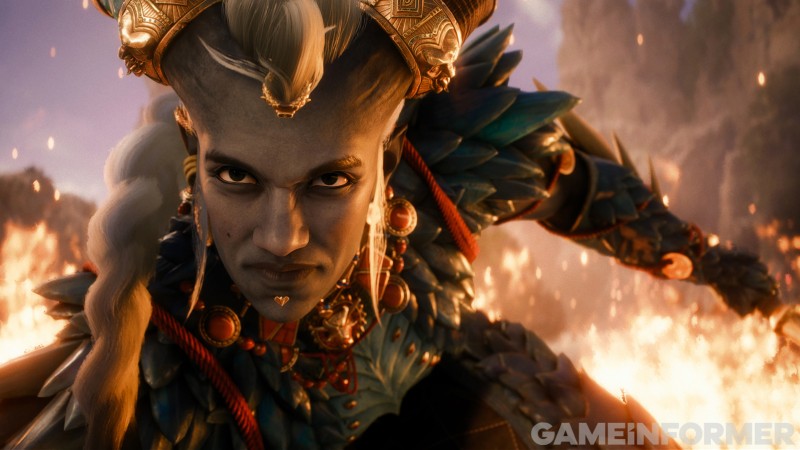Throughout my visit to BioWare’s Edmonton office for Game Informer’s current cover story about Dragon Age: The Veilguard, game director Corinne Busche reiterates that the studio designed the game with inclusivity in mind. That’s extremely evident in the character creator, where players begin their journey in Veilguard. It’s easily the best character creator in series history and possibly the most robust I’ve ever seen in a video game. From hundreds of sliders and options to customize your player-controlled Rook to the ability to pick pronouns separate from gender and more, this character creator speaks directly to the inclusivity of Veilguard – read about my in-depth look at the character creator here.
But that feeling doesn’t end in the character creator. It also extends to the world – ice mage and private detective companion Neve Gallus has a prosthetic leg, for example – and in the way you can play Veilguard.
Before starting the game proper, a playstyle screen allows players to customize various options affecting how Veilguard plays. Here, you can select difficulty, or playstyle as BioWare calls it, with options like “Storyteller” for those interested more in the story versus the combat, “Adventurer” for an experience that seemingly balances story and combat, and a difficulty called Nightmare – there might be more, but this is all I see during my demo. At any point during Veilguard, you can change the game’s difficulty unless you select Nightmare, which is the hardest of difficulties. That’s a permanent selection.
There’s another difficulty option called Unbound, though, allowing players to customize their gameplay experience to their liking. You can adjust how wayfinding helps you in-game; there’s aim assistance and even an auto-aim option. You can adjust combat timing to make parrying easier or harder, with a balanced, forgiving, and a third harder option. You can change how much damage your enemies do to you, and how much damage you do to enemies by adjusting their health. There’s also an option to adjust enemy pressure. And, if you’re not interested in death-related setbacks, there’s a no-death option you can turn on.
“[None of these options] are a cheat,” Busche tells me. “It’s an option to make sure players of all abilities can show up.”
She also says players can look forward to similar accessibility and approachability options you might expect, though I’m unable to pour through Veilguard’s other options to confirm exactly what’s there.
For more about the game, including exclusive details, interviews, video features, and more, click the Dragon Age: The Veilguard hub button below.
Throughout my visit to BioWare’s Edmonton office for Game Informer’s current cover story about Dragon Age: The Veilguard, game director Corinne Busche reiterates that the studio designed the game with inclusivity in mind. That’s extremely evident in the character creator, where players begin their journey in Veilguard. It’s easily the best character creator in series history and possibly the most robust I’ve ever seen in a video game. From hundreds of sliders and options to customize your player-controlled Rook to the ability to pick pronouns separate from gender and more, this character creator speaks directly to the inclusivity of Veilguard – read about my in-depth look at the character creator here.
But that feeling doesn’t end in the character creator. It also extends to the world – ice mage and private detective companion Neve Gallus has a prosthetic leg, for example – and in the way you can play Veilguard.
Before starting the game proper, a playstyle screen allows players to customize various options affecting how Veilguard plays. Here, you can select difficulty, or playstyle as BioWare calls it, with options like “Storyteller” for those interested more in the story versus the combat, “Adventurer” for an experience that seemingly balances story and combat, and a difficulty called Nightmare – there might be more, but this is all I see during my demo. At any point during Veilguard, you can change the game’s difficulty unless you select Nightmare, which is the hardest of difficulties. That’s a permanent selection.
There’s another difficulty option called Unbound, though, allowing players to customize their gameplay experience to their liking. You can adjust how wayfinding helps you in-game; there’s aim assistance and even an auto-aim option. You can adjust combat timing to make parrying easier or harder, with a balanced, forgiving, and a third harder option. You can change how much damage your enemies do to you, and how much damage you do to enemies by adjusting their health. There’s also an option to adjust enemy pressure. And, if you’re not interested in death-related setbacks, there’s a no-death option you can turn on.
“[None of these options] are a cheat,” Busche tells me. “It’s an option to make sure players of all abilities can show up.”
She also says players can look forward to similar accessibility and approachability options you might expect, though I’m unable to pour through Veilguard’s other options to confirm exactly what’s there.
For more about the game, including exclusive details, interviews, video features, and more, click the Dragon Age: The Veilguard hub button below.Read MoreGame Informer



